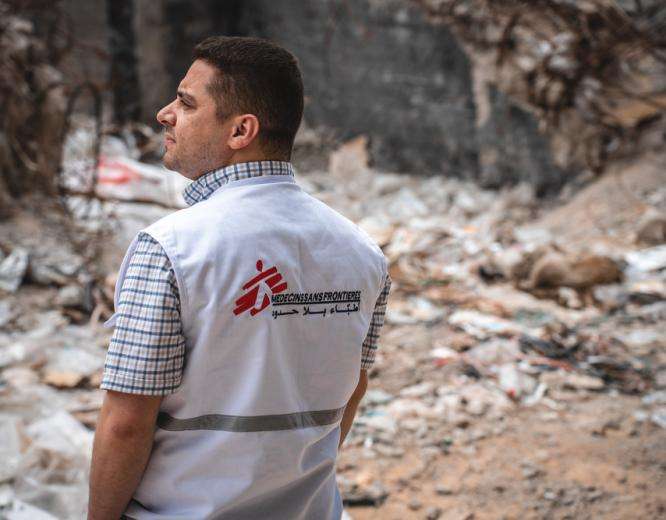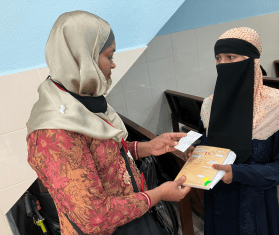NEW YORK/JERUSALEM, October 2, 2024 — One year into the escalation of war in Gaza, the medical and humanitarian situation is catastrophic, said Doctors Without Borders/Medecins Sans Frontieres (MSF). Israel’s all-out war and punishing siege have destroyed Gaza’s already fragile health system, repeatedly displaced people who have been forced into smaller and smaller areas, and choked off access to desperately needed food, water, and medicines.
On October 7, 2023, Hamas militants launched a horrific attack inside Israel, leaving 1,200 people dead and taking 251 people as hostages. In response, the Israeli military launched a horrific assault on Gaza that has so far killed more than 41,500 people, wounded 96,000, and displaced approximately 1.9 million people. Violence has since surged in the West Bank, in Lebanon, and across the region.

“This has been a year of unrelenting horror and violence against civilians, with no end in sight,” said Avril Benoît, chief executive officer of MSF USA. “As this conflict spreads across the region, we repeat our urgent call for an immediate ceasefire in Gaza. This is the only way to stop the spiraling violence and bring lifesaving care to people who are struggling to survive.”
Medical needs of Palestinians in Gaza
Palestinians in Gaza are suffering from war wounds, infectious diseases, malnutrition, and mental trauma while living in overcrowded and inhumane conditions. MSF medical staff have treated patients on a daily basis with wounds caused by bombings. People have extensive burns, crushed bones, and amputated limbs—all of which require intensive and long-term care that is not possible under current conditions. Since the escalation of war last October, MSF teams have treated more than 27,500 patients for violence-related injuries, with more than 80 percent of the wounds linked to shelling.
“Israeli bombardments of densely populated areas have repeatedly caused injuries on a massive scale,” said Dr. Amber Alayyan, MSF medical program manager. “Our teams have been forced to perform surgeries without anesthesia, witness children die on hospital floors due to a lack of resources, and even treat their own colleagues and family members. Meanwhile, the health care system in Gaza has been systematically dismantled by Israeli forces.”
Well before October 7, MSF was already treating people in Gaza suffering from the effects of Israel’s 17-year occupation, blockade, and recurrent attacks. Teams have cared for patients with life-altering physical injuries, severe burns, and mental health conditions.
Attacks on health care leave few medical options
As medical needs are growing exponentially, people’s options for care are shrinking. Israeli forces have committed widespread and systematic attacks on Gaza’s health care system and other vital civilian infrastructure. The health care system is now on the edge of collapse. Today, only 17 out of 36 hospitals are partially functional. Warring parties have conducted hostilities near medical facilities, endangering patients, caretakers, and medical staff. Six MSF colleagues have been killed. From October 2023, staff and patients from MSF have had to leave 14 different health structures, due to serious incidents and ongoing fighting. Each time a medical facility is evacuated, thousands of people lose access to lifesaving medical care. This will have consequences on people’s health, not just in the immediate term, but in the weeks and months to come.


Destruction at Nasser Hospital following Israeli forces' siege of the facility earlier this year. Palestine 2024 © Ben Milpas/MSF
The lack of access to health care is compounded by the lack of humanitarian and medical supplies in Gaza. Israeli authorities have routinely imposed unclear, unpredictable criteria for authorizing the entry of supplies. Once supplies cross into the Gaza Strip, they often do not make it to their destination, due to an absence of safe and accessible roads, ongoing fighting, and looting of food and basic items. The first step in addressing this is for Israel to open vital land borders to ensure massive humanitarian and medical aid can reach those in need. The blockade on Gaza must end.

The US has a responsibility to ensure its support is not used to harm civilians
“For one year, Israel’s allies have continued to provide their military support to Israel, as children are killed en masse, tanks fire on deconflicted shelters, and fighter jets bomb so-called humanitarian zones,” said Chris Lockyear, MSF’s secretary general. “This has been accompanied by a consistent public narrative dehumanizing people in Gaza and failing to distinguish between military targets and civilian lives. The only way to stop the killing is with an immediate and sustained ceasefire."
Israel and Hamas, supported by their respective allies, have failed time and time again to implement a sustained ceasefire in Gaza. While the US led efforts in June to secure passage of a ceasefire resolution by the UN Security Council, it has vetoed previous resolutions brought by other Council members and continues to provide arms to Israel. Israel must immediately stop the indiscriminate killing of civilians in Gaza and urgently facilitate the delivery of aid to alleviate suffering inside the Strip—and its allies must demand they do so. Under international norms and laws, civilians must be protected from violence and have the right to access humanitarian assistance, especially medical care.
“The US remains the leading provider of military and financial support to Israel, fueling the destruction of Gaza and the resulting humanitarian crisis,” Benoît said. “As a leading ally of Israel, the US has a particular responsibility to ensure that its support is not used to kill and maim civilians, attack hospitals and health workers, and block the delivery of humanitarian aid in Gaza."
In Gaza, MSF is currently running medical activities in two hospitals, Al-Aqsa and Nasser Hospitals, eight health care facilities, and two field hospitals in Deir al-Balah. Field hospitals cannot replace the health care system that Israel has dismantled in Gaza. Since the beginning of the war, MSF teams have offered surgical support, wound care, physiotherapy, maternity and pediatric care, primary health care, vaccination, mental health services, and water distribution.

UPCOMING EVENT
Gaza: Medical care under fire
October 15, 2024, 1:00PM - 1:45PM ET
Live online
Read More



